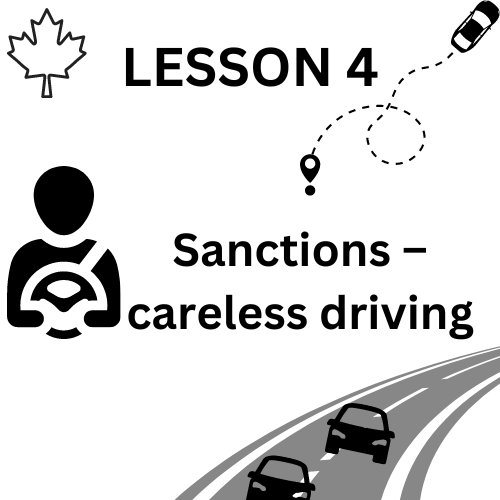Careless driving is a serious offense that poses dangers to both the driver and others out and about. This article investigates the authorizations related to thoughtless driving in Canada, analyzing the legitimate ramifications, requirement components, and the more extensive effect on street security and public responsibility.
Grasping Imprudent Driving:
Thoughtless driving, as characterized in Canadian transit regulations, alludes to working a vehicle without due care and consideration or without sensible thought for others out and about. This offense incorporates a large number of ways of behaving, from occupied driving and forceful moves to activities that display an absence of watchfulness or judiciousness.
Lawful Ramifications:
- ** Punishments and Fines:** Drivers who are found guilty of careless driving face severe consequences. Depending on the severity of the incident, the number of injuries sustained, and any property damage caused, fines can range anywhere from hundreds to thousands of dollars.
- Negative Mark Points: Convictions for imprudent driving regularly bring about the amassing of fault focusing on the driver’s record. Negative mark focuses are essential for a framework intended to recognize and punish drivers who reliably take part in risky or careless ways of behaving.
- Suspension of License: In instances of outrageous wildness or rehashed offenses, the court might settle on a permit suspension. This action is pointed toward keeping people from proceeding to represent a gamble out and about until they exhibit a guarantee to more secure driving practices.
- Criminal Charges: In examples where thoughtless driving prompts extreme wounds or fatalities, criminal accusations, for example, of risky driving inflicting damage or passing, might be sought after. This hoists the legitimate results, possibly prompting detainment.
Requirement Components:
- Traffic Tickets and Citations: Policemen have the position to give traffic tickets or references for reckless driving. These reports detail the offense, the related fine, and any extra punishments. Drivers have the choice to challenge the ticket in court.
- Municipal court Hearings: In traffic court, people who are accused of careless driving have the right to challenge the charges. This lawful interaction permits the blamed to communicate their viewpoint, challenge proof, and look for a fair goal. In order to successfully navigate the court system’s complexities, legal representation may be recommended.
- Examinations and Evidence: Policing conducts careful examinations in instances of serious mishaps or careless driving. This might include gathering observer proclamations, examining crash scene proof, and using innovation, like traffic camera film, to construct a thorough case.
More extensive effects on street security due to careless driving:
- Deterrence: Sanctions for careless driving act as a deterrent, dissuading people from engaging in unsafe activities while driving. The danger of lawful outcomes builds up the significance of dependable driving practices.
- Advancing Accountability: Sanctions for indiscreet driving add to responsibility, considering people answerable for their activities in the driver’s seat. This encourages a feeling of obligation and stresses the cultural assumption that drivers focus on wellbeing.
- Instructive Opportunities: Close by correctional measures, there is a chance for schooling. A few wards might command cautious driving courses or instructive projects for people sentenced for imprudent driving. These drives intend to improve mindfulness and ingrain more secure driving propensities.
Considerations and Challenges:
- Subjectivity in Enforcement: Figuring out what is reckless driving can be abstract, and authorization might fluctuate among locales and individual officials. This issue can be addressed by establishing clear guidelines and standardized enforcement criteria.
- Adjusting Seriousness and Rehabilitation: Finding some kind of harmony between the seriousness of punishments and recovery endeavors is fundamental. While there should be opportunities for people to learn from their mistakes and improve their driving habits, penalties should also serve as a deterrent.
- Legitimate Representation: Exploring the lawful cycle, particularly in municipal court, can be trying for people without legitimate ability. Admittance to legitimate portrayal guarantees that people have a fair opportunity to put forth their viewpoint and comprehend the ramifications of the charges they face.
Strategy Proposals:
- Normalized Implementation Guidelines: Laying out normalized rules for deciding reckless driving offenses can upgrade consistency in implementation. This includes clear criteria for spotting reckless actions and carrying out investigations.
- Schooling and Mindfulness Campaigns: It is essential to make investments in public awareness and education campaigns. These drives can educate drivers about the perils regarding imprudent driving, advance capable way of behaving, and feature the likely results of legitimate assents.
- Elective Penalties: Investigating elective punishments, like obligatory protective driving courses, can give people open doors for training and recovery. These actions can be incorporated into the endorsing system, supplementing conventional fines and negative mark focuses.

Conclusion:
Sanctions for reckless driving in Canada assume an essential part in keeping up with street wellbeing and considering people responsible for their activities. The legitimate ramifications, implementation systems, and more extensive effect on street security highlight the significance of an exhaustive way to deal with tending to wild ways of behaving out and about. Finding a balance between rehabilitative measures, public education, and punitive measures is crucial as Canada continues to refine its road safety regulations. The objective is to establish a culture of safer and more responsible driving for everyone on the roads through proactive and effective enforcement.
